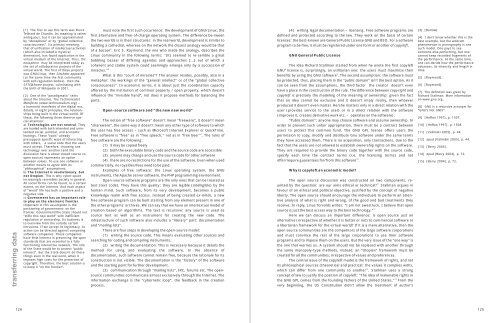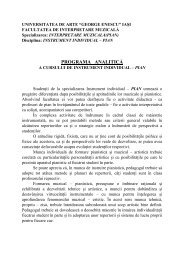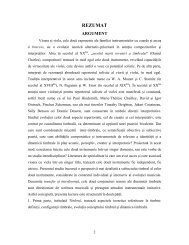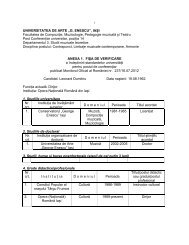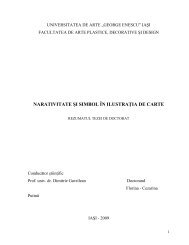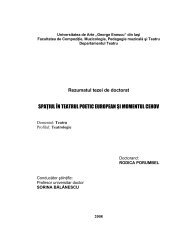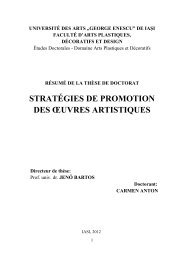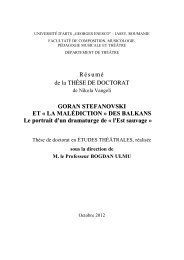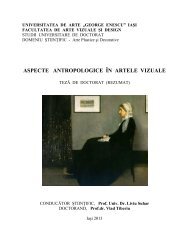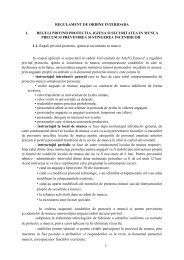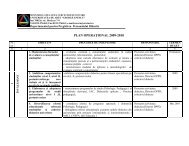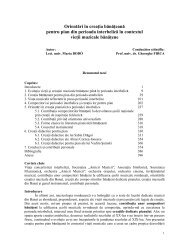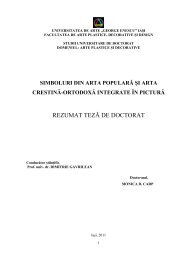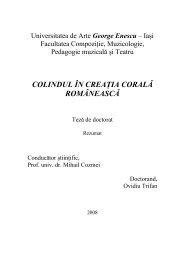vector 2_1.cdr - Universitatea de Arte "George Enescu"
vector 2_1.cdr - Universitatea de Arte "George Enescu"
vector 2_1.cdr - Universitatea de Arte "George Enescu"
Create successful ePaper yourself
Turn your PDF publications into a flip-book with our unique Google optimized e-Paper software.
transferring data<br />
[1] The first to use this term was Pierre<br />
Teilhard <strong>de</strong> Chardin. Its meaning is rather<br />
ambiguous, but it can be approximated<br />
by "i<strong>de</strong>osphere" or by "global collective<br />
consciousness". Its primary meaning,<br />
that of unification of intellectual activities<br />
(which also inclu<strong>de</strong>d a mystical<br />
dimension), has found application in the<br />
virtual medium of the Internet. Thus, the<br />
noosphere may be interpreted today as<br />
the set of collaborative projects of the<br />
virtual world. The first of these projects<br />
was GNU/Linux, then Slashdot appeared<br />
(at the same time the first community<br />
with self-regulation bodies), then the<br />
SETI@home project, culminating with<br />
the birth of Wikipedia in 2001.<br />
[2] One of the "paradigmatic" texts<br />
about the Internet, The Technorealist<br />
Manifesto (www.technorealism.org) –<br />
a humanist manifesto of the digital era,<br />
<strong>de</strong>tails, in eight principles, the relationships<br />
being built in the virtual world. Of<br />
these, the following three <strong>de</strong>serve special<br />
attention:<br />
a) Technologies are not neutral. They<br />
are loa<strong>de</strong>d with both inten<strong>de</strong>d and uninten<strong>de</strong>d<br />
social, political, and economic<br />
leanings. These "tools" already<br />
presuppose specific ways of interacting<br />
with others, a social co<strong>de</strong> that the users<br />
must accept. Therefore, choosing one<br />
technology over another (and the<br />
discussion here is about closed source vs.<br />
open source) represents an option<br />
between values. To use one software or<br />
another means to agree with its<br />
"philosophical" assumptions.<br />
b) The Internet is revolutionary, but<br />
not Utopian. This is why cyber-space<br />
increasingly resembles society in general.<br />
All social forms can be found, to a certain<br />
extent, on the Internet. And each aspect<br />
of "wired" life has both a positive and a<br />
negative si<strong>de</strong>.<br />
c) Government has an important role<br />
to play on the electronic frontier.<br />
Important in this assumption is the<br />
positioning of government: on the<br />
frontier. Government/the State should not<br />
"stifle this new world" with inefficient<br />
regulation or censorship. Its business is<br />
to overview from the outsi<strong>de</strong> certain<br />
intrusions. If we accept its legitimacy, its<br />
action can be directed against competing<br />
software companies. These companies<br />
have little interest in preserving the open<br />
standards that are essential to a fully<br />
functioning interactive network. The role<br />
of the State would be to protect "public<br />
interest". But the State doesn't do these<br />
things even in the real word, when it<br />
imposes high costs for the protection of<br />
copyright. Therefore, the best solution is<br />
to keep it "on the frontier".<br />
must note the first such occurrence: the <strong>de</strong>velopment of GNU/Linux, the<br />
first alternative and free-of-charge operating system. The difference be-tween<br />
the two worlds is in their structures: in the real world, <strong>de</strong>velopment is similar to<br />
building a cathedral, whereas on the network the closest analogy would be that<br />
5<br />
of a bazaar . Eric S. Raymond, the one who ma<strong>de</strong> the analogy, <strong>de</strong>scribes the<br />
Linux community in the following terms: "(it) seemed to re-semble a great<br />
babbling bazaar of differing agendas and approaches [...] out of which a<br />
coherent and stable system could seemingly emerge only by a succession of<br />
6<br />
miracles."<br />
What is this "court of miracles"? The answer resi<strong>de</strong>s, possibly, also in a<br />
metaphor: the workings of the "general intellect" or of the "global collective<br />
consciousness". In economic terms, it is about just the coordination capacity<br />
offered by the institution of common property / open property, which doesn't<br />
influence the "invisible hand", not does it propose methods for balancing the<br />
parts.<br />
Open-source software and "the new new world”<br />
The notion of "free software" doesn't mean "freeware", it doesn't mean<br />
"shareware", the same way it doesn't mean any other type of software to which<br />
the user has free access – such as Microsoft Internet Explorer or QuickTime.<br />
7<br />
Free software is "free'' as in "free speech,'' not as in "free beer'' . The rules of<br />
free software are the following:<br />
(1) it may be copied freely<br />
(2) both the executable binary co<strong>de</strong> and the source co<strong>de</strong> are accessible<br />
(3) anyone may change and use the source co<strong>de</strong> for other software<br />
(4) there are no restrictions for the use of the software. Even when used<br />
commercially, no royalties/fees need to be paid.<br />
Examples of free software: the Linux operating system, the GNU<br />
instruments, the Apache server software, the PHP programming environment.<br />
Open-source software programs are the only ones that can be treated as<br />
text (text co<strong>de</strong>). They have this quality: they are legible (intelligible) by the<br />
human mind. Such software, from its very <strong>de</strong>velopment, becomes a public<br />
knowledge realm with free access. Instead of being created ex-nihilo, a new<br />
free software program can be built starting from any element present in one of<br />
the other programs' archives. We can say that we have an intertextual mo<strong>de</strong>l of<br />
creation based on algorithms. The text is recursive: any source is used as<br />
source text as well as an instrument for creating the new co<strong>de</strong>. The<br />
infrastructure of such software also inclu<strong>de</strong>s a "literary" part: documentation<br />
and "mailing lists".<br />
There are four steps in <strong>de</strong>veloping the open-source mo<strong>de</strong>l:<br />
(1) writing the source co<strong>de</strong>. This means evaluating other sources and<br />
searching for coding and compiling instruments.<br />
(2) writing the documentation. This is necessary because it <strong>de</strong>tails the<br />
method for using and evaluating the software. In the absence of<br />
documentation, such software cannot remain free, because the rationale for its<br />
construction is not visible. The documentation is the "history" of the software<br />
and the starting point for further <strong>de</strong>velopment.<br />
(3) communication through "mailing lists", IRC, forums etc. The opensource<br />
communities communicate almost exclusively through the Internet. The<br />
information exchange is the "cybernetic loop": the feedback in the creation<br />
process.<br />
(4) writing legal documentation – licensing. Free software programs are<br />
<strong>de</strong>fined and protected according to the law. They work on the basis of certain<br />
licenses: the best-known are General Public License GNU and BSD. For a software<br />
program to be free, it must be registered un<strong>de</strong>r one form or another of copyleft.<br />
GNU General Public License<br />
The i<strong>de</strong>a Richard Stallman started from when he wrote the first copyleft<br />
8<br />
GNU license is, surprisingly, an utilitarian one: the users must maximize their<br />
9<br />
benefits by using the GNU software . The second assumption: the software must<br />
be protected, thus, placing them in the "public domain" isn't the best option. As it<br />
can be seen from the assumptions, the third factor the creator doesn't even<br />
have a place in the construction of the rule. The difference between copyright and<br />
copyleft is precisely the mo<strong>de</strong>ling of the meaning of ownership: given the fact<br />
that an i<strong>de</strong>a cannot be exclusive and it doesn't imply rivalry, then whoever<br />
produced it doesn't even matter. He/she matters only in a direct relation with the<br />
user (provi<strong>de</strong>s service to the user) or in a direct relation with the software<br />
(improves it, creates <strong>de</strong>rivative work etc. – operates on the software).<br />
"Public domain": anyone may choose software and assume ownership. In<br />
or<strong>de</strong>r to prevent such unfair appropriation, there must be a contract between<br />
users to protect this common fund. The GNU GPL license offers users the<br />
permission to copy, modify and distribute Gnu software un<strong>de</strong>r the same terms<br />
they have accessed them. There is no acquisition, only transactions, due to the<br />
fact that the users are not allowed to establish ownership rights on the software.<br />
They are required to provi<strong>de</strong> the binary co<strong>de</strong> together with the source co<strong>de</strong>,<br />
specify each time the contract terms (i.e. the licensing terms) and not<br />
10<br />
offer/require guarantees for/from this software .<br />
Why is copyleft an economic mo<strong>de</strong>l?<br />
The open source discussion was constructed on two components, re-<br />
11<br />
united by the question: are our aims ethical or technical? Stallman argues in<br />
favour of an ethical and political objective, justified by the concept of negative<br />
liberty. The open source should encourage the individuals to perform an attentive<br />
analysis of what is right and wrong, of the good and bad treatments they<br />
receive. In reply, Linus Torvalds writes: "I am not awestruck. I believe that open<br />
12<br />
source is just the best access way to the best technology."<br />
Here we can discuss an important difference: is open source just an<br />
alternative (irrespective of whether it is better or not) to commercial software or<br />
a libertarian framework for the virtual world? If it is a mere alternative, then the<br />
open source communities are the competitors of the large software corporations<br />
and must convince the rest of the large corporations to use their software<br />
programs and to impose them on the users. But the very issue of the "one way" is<br />
the one that worries us. A system should not be replaced with another through<br />
the same monopoly-type methods, instead, an "Utopian" framework must be<br />
created for all the communities, irrespective of values and preferences.<br />
The central issue of the copyleft mo<strong>de</strong>l is the framework of rights, and not<br />
its philosophical sources (theoretical and practical: the values it complies with),<br />
13<br />
which can differ from one community to another . Stallman uses a strong<br />
concept of law to justify the position of copyleft: "The i<strong>de</strong>a of inalienable rights in<br />
14<br />
the GNU GPL comes from the founding fathers of the United States." From the<br />
very beginning, the US Constitution didn't allow the treatment of author's<br />
[3] [Barlow].<br />
[4] I don't know whether this is the<br />
best example, but the webcam<br />
phenomenon in pornography is one<br />
such mo<strong>de</strong>l. One pays to see<br />
someone else performing, but one<br />
cannot keep recor<strong>de</strong>d fragments of<br />
the performance. At the same time,<br />
one can <strong>de</strong>ci<strong>de</strong> how the performance<br />
advances, its intensity and length in<br />
time.<br />
[5] [Raymond].<br />
[6] [Raymond].<br />
[7] The <strong>de</strong>finition was given by<br />
Richard Stallman. More information<br />
on www.gnu.org.<br />
[8] GNU is a recursive acronym for<br />
“GNU's Not UNIX”.<br />
[9] [Heffan 1997], p. 1507.<br />
[10] [Heffan 1997], p. 1508.<br />
[11] [Välimäki 2005], p. 44.<br />
[12] apud [Välimäki 2005], p. 44.<br />
[13] [Berry 2004].<br />
[14] apud [Berry 2004], p. 72.<br />
[15] [Berry 2004], p. 72.<br />
124 125


